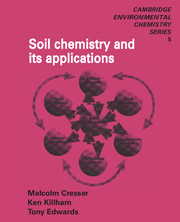1 - Why study soil chemistry?
Published online by Cambridge University Press: 05 August 2012
Summary
It doesn't matter who you are or where you are, your very existence and survival depend upon the chemical reactions taking place all the time in soil. Indeed, this book itself owes its existence to the same reactions. The paper originates from trees grown in soil, the ink is from chemicals traceable back to the soil, and the authors are mere links in a complex food chain passing through soil-based cycles. The longevity of their role depends upon soil-derived food and regulation of the composition of the atmosphere by chemical reactions controlling the growth of photo synthesising plants. Of all the scientific disciplines that interact to make up the complex web of environmental science, soil chemistry could therefore be regarded as the most central. It is worth elaborating upon this concept, because any vague and fuzzy images the reader might have of possible applications of soil chemistry should then spring sharply into focus.
Figure 1.1 is an attempt to demonstrate the central role of soil chemistry, and its major interactions with other aspects of science. The outer ring of topics is impressive in its scope, but is by no means exhaustive. We could, for example, include terrestrial and aquatic zoology, since soils affect plants and water quality, and hence animal life. Plants may influence climate on a local scale and, in the long term, on a global scale, so we could add meteorology.
- Type
- Chapter
- Information
- Soil Chemistry and its Applications , pp. 1 - 9Publisher: Cambridge University PressPrint publication year: 1993

